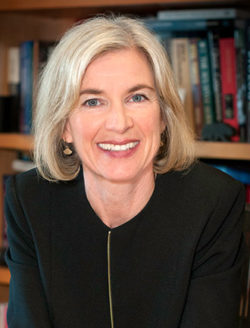Nicola Spaldin, Professor, Department of Materials, ETH Zurich – December 19, 2019
Dr. Spaldin is Professor of Materials Theory in the Department of Materials at ETH Zurich. She is best known for her work developing the class of materials known as multiferroics, for which she received the American Physical Society’s McGroddy Prize, the Koerber European Science Prize, the L’Oréal-UNESCO for Women in Science award and the Swiss Science Prize Marcel-Benoist among many others. She is a passionate science educator, coordinator of the curriculum development project “The Materials Scientist 2030, Who is She?”, and holder of the ETH Golden Owl Award for excellence in teaching. When not trying to make a room-temperature superconductor, she can be found playing her clarinet or skiing or climbing in the Alps.
Past Events
Marcia McNutt, President, National Academy of Sciences (NAS) – February 26, 2019 
Marcia McNutt is a geophysicist and president of the National Academy of Sciences. From 2013 to 2016, she served as editor-in-chief of the Science family of journals. Prior to joining Science, she was director of the U.S. Geological Survey (USGS) from 2009 to 2013. During her tenure, the USGS responded to a number of major disasters, including earthquakes in Haiti, Chile, and Japan, and the Deepwater Horizon oil spill. Before joining the USGS, McNutt served as president and chief executive officer of the Monterey Bay Aquarium Research Institute (MBARI), in Moss Landing, California. McNutt began her academic career at the Massachusetts Institute of Technology (MIT), where she was the E.A. Griswold Professor of Geophysics and directed the Joint Program in Oceanography/Applied Ocean Science & Engineering, jointly offered by MIT and the Woods Hole Oceanographic Institution. McNutt received a BA in physics from Colorado College and her PhD in Earth sciences at the Scripps Institution of Oceanography.
 Geri Richmond, Presidential Chair in Science and University of Oregon Professor of Chemistry – June 11, 2018
Geri Richmond, Presidential Chair in Science and University of Oregon Professor of Chemistry – June 11, 2018
Geraldine (Geri) Richmond is the Presidential Chair in Science and Professor of Chemistry at the University of Oregon where she has been since 1985. A native of Kansas, she received her undergraduate degree in chemistry from Kansas State University and her Ph.D. in physical chemistry from the University of California, Berkeley. Her educational efforts have focussed largely on introductory chemistry and science literacy courses as well as being the director of several University of Oregon undergraduate research programs. Her research examines the chemistry and physics that occurs at complex surfaces that have relevance to important problems in energy production, environmental remediation and atmospheric chemistry. Using a combination of laser-based methods and theoretical simulations her most recent efforts have focussed on understanding environmentally important processes at water surfaces. Over 200 publications have resulted from the studies conducted in her laboratory with undergraduate, graduate students and postdoctoral associates
Jennifer Doudna, Biochemist Faculty Scientist at Berkeley Lab; Professor, UC Berkeley; Principal Investigator, Howard Hughes Medical Institute – November 20, 2017
Jennifer Doudna is a Li Ka Shing Chancellor Chair Professor in the Department of Chemistry and the Department of Molecular and Cell Biology at the University of California, Berkeley. Doudna has been an investigator with the Howard Hughes Medical Institute (HHMI) since 1997, and since 2018 holds the position of senior investigator at the Gladstone Institutes as well as that of professor at the University of California, San Francisco. Doudna has been a leading figure in what is referred to as the “CRISPR revolution” for her fundamental work and leadership in developing CRISPR-mediated genome editing. In 2012, Doudna and Emmanuelle Charpentier were the first to propose that CRISPR/Cas9 (enzymes from bacteria that control microbial immunity) could be used for programmable editing of genomes, which is now considered one of the most significant discoveries in the history of biology.
